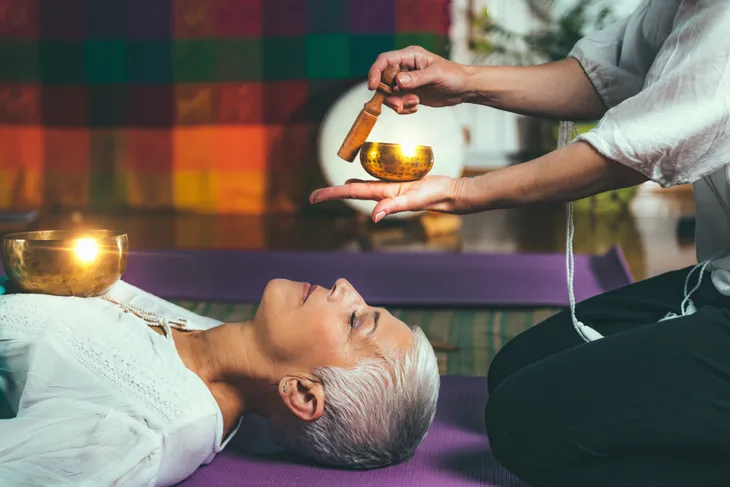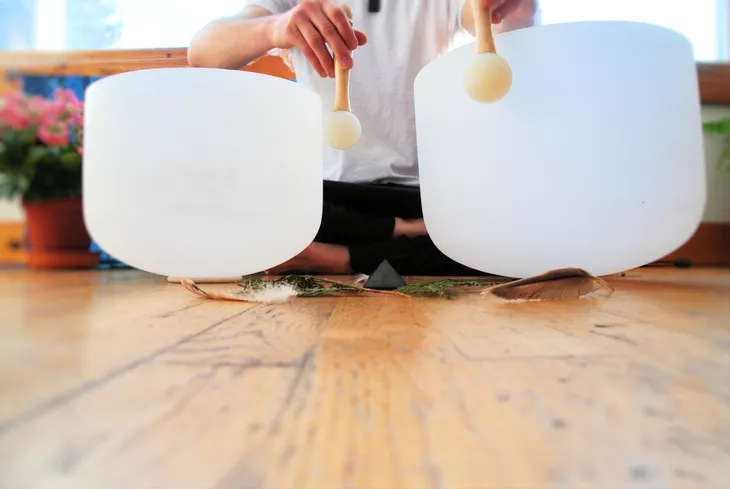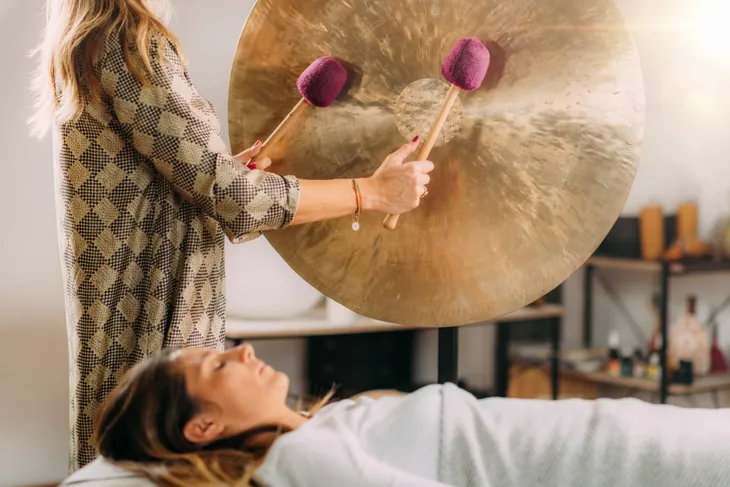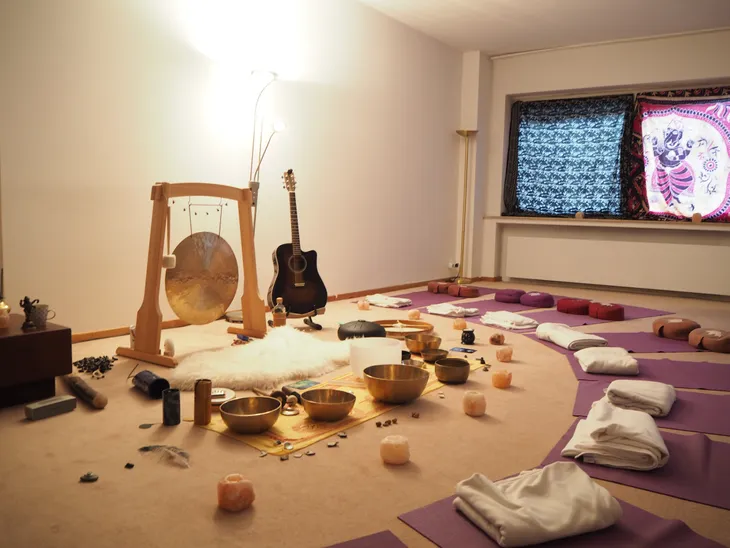- Sound baths are a meditative experience that use special instruments to create soothing, overlapping vibrations.
- These vibrations are meant to move participants into a state of contemplation and relaxation.
- Research shows sound baths can have positive effects on mental and physical health.
We all have stress in our lives, whether it’s from work, family life, or just having one of those days. Nobody can avoid stress entirely. What we can do is find ways to better manage and deal with the effects of stress. One of the ways to do this is with stress relieving practices, such as a sound bath.
Many people use sound baths as a form of healing, others as a form of relaxation. It’s an immersive, full-body meditative experience that provides many benefits. While there is no evidence that it can heal or treat medical conditions, people have been practicing sound baths for thousands of years. Here’s a look into what a sound bath is, the many benefits, and how to try it…
What is a Sound Bath?
Despite the name, there is no water involved in these baths! However, it does have many other similarities. You’ll be laying down, relaxing, and one could argue instead of immersing oneself in water, you’ll be immersed in sounds. These events typically happen in a group setting, but they can be done alone or in a one-on-one session.
According to Medical News Today, participants lay down and listen to highly resonant, immersive music made by special musical instruments. “In most cases, the bath involves singing bowls, which are small bell-like instruments that create a resonant tone when a person strikes them,” writes the source.
How Does it Work?
Sound baths work by harnessing the phenomenon called “sound healing” which has been used by many cultures for thousands of years, explains Healthline. So what exactly does this entail? When attending a sound bath, you’ll begin by laying on your back or in a reclining position. It often takes place after some form of meditation or yoga.
Next, the host or provider who is trained in sound bath musical techniques will use one of their instruments to create “soothing, overlapping vibrations,” writes the source. These vibrations are theoretically meant to lead participants “deeper into a state of contemplation or relaxation” and shut off the body’s fight-or-flight reflex. At the end of the session, the provider will guide participants back to a state of awareness before ending the session.
History of Sound Baths
You might only be learning about sound baths for the first time, but this practice of meditation has been around for a very long time. Many cultures around the world practice meditation and most have their own form of music or musical instruments. However, according to the Tricycle Foundation, a Buddhist nonprofit, the origins of singing bowls and sound baths are unclear.
Many people assume they originated in Tibet because singing bowls are sometimes known as “Tibetan” singing bowls. “While sound and music have long been part of religious practices in Tibet and other East Asian countries, chimes and bells seem to be more prevalent,” writes Medical News Today. But there’s a similar Japanese instrument called a rin which resembles a singing bowl.
An article in the New York Times writes that various cultures for many centuries, including South Asia, have used sound as part of their religious ceremonies and prayer to promote and facilitate meditation. “Most religions and cultures use music and sound for spiritual reasons,” notes the source.
Benefits of Sound Baths
Reduce Stress and Anxiety
The most talked about benefits of sound baths are its positive effects on mental health. Participants typically leave feeling more relaxed. It’s often used as a way to reduce stress, anxiety, and sometimes depression. Healthline references several studies to reinforce these claims. For example, a 2016 study of 62 adults gathered their feelings prior to attending a sound bath and then again afterwards. It found that tension, anxiety, and any negative moods were significantly decreased afterwards.
While there aren’t many studies pertaining specifically to sound baths, there is lots of research around music and the benefits of meditation. Another 2018 study asked half of the participants (30 out of 60) to listen to the music of Tibetan singing bowls before going into surgery while the other half had headphones with no music. “The analysis found that heart rate and other vitals that indicate anxiety improved in those who were given the headphones with music,” writes Healthline.
Lastly, the source references a 2020 research review which analyzed four studies. They all found evidence that participants had improvements in their distressed mood, tension, anger and confusion after a sound bath with Tibetan singing bowls.
Decrease Physical Pain
Even though there is no real physical aspect to sound baths, there is some evidence showing it can reduce or ease physical pain. Healthline again references the same 2016 study where participants were also asked if they were in pain. If so, they had to rank their level of pain on a scale of 1 to 5. “Before a sound bath, these study participants tended to rank their pain higher than they did afterward,” writes Healthline. The source also notes that more clinical research needs to be done.
In the 2020 review some physical symptoms were also reviewed. Researchers found improvements in blood pressure and heart rate, but again more research is needed to make any definitive conclusions.
Cope with Chronic Illness
While sound baths cannot cure or treat any medical condition by any means, they can assist in managing or relieving symptoms. Everyday Health talked to Nate Martinez, a certified sound therapy practitioner and founder of NTM Sound who explains that because sound baths create an environment conducive to relaxation, it can have both mental and physical effects. The sound waves work to slow down the heart and respiratory rate which has a therapeutic effect on the body.
“…sound affects our whole being positively, it can be especially helpful for people with chronic illnesses,” says Martinez to Everyday Health. “It’s especially challenging when the nervous system is constantly in fight-or-flight mode due to a chronic issue. The result is increased tension and an impact on the nervous system.” He goes on to explain that sound can help ease this tension and reframe our perspective.
Who is a Good Candidate?
What’s great about sound baths is that every person is a good candidate. They are for any person at any stage in their life, no matter athletic ability or flexibility. You can attend one when pregnant, during or after rehab, old, young, experiencing disease, illness, or trauma, notes VeryWell Mind.
They offer another option for people who have a hard time connecting with traditional meditation or yoga. The source spoke to Tamalyn Millar, lead sound practitioner at Naturopathica Chelsea in NYC who advises people to attend a sound bath when they feel they need it. Ideally it would be on a weekly basis, but mainly when they are feeling overwhelmed or stressed.
Who is Not a Good Candidate?
There’s no denying sound baths have their benefits, but people should be realistic about what they can and cannot do. They are a safe space for most people no matter their age or athletic ability. Basically anyone who interested in having a new experience or those who are looking for a way to relax, unwind, and recharge.
However, Medical News Today warns that there are certain people who would not be ideal candidates for a sound bath. This would be people who find intense sounds stressful or overstimulating. People who suffer from migraines with noise triggers should also avoid sound baths. Lastly, anyone with hearing aids might want to opt out as the experience will likely be uncomfortable. If you have a mental health condition, the source also suggests checking with a doctor before attending a sound bath as the experience could bring up both pleasant and unpleasant feelings.
Sound Bath vs. Music Therapy
Since both use musical instruments and tout mental health benefits, some people might confuse sound baths and music therapy. However, they are two very different things. According to Medical News Today, music therapy is “a broad group of practices that incorporate music into therapeutic techniques for physical and mental health.” Music therapists use these techniques to help people express themselves, process feelings, enhance memory, and achieve other goals.
A sound bath is more of a spiritual practice than medical therapy. It uses the feelings of the sound vibrations throughout the body to relax, heal, and meditate. While music therapy has to be done by a certified professional, Medical News Today explains that a person doesn’t need specific qualifications to host a session. However, most have a background in complementary practices like therapy, yoga, or meditation.
How to Do a Sound Bath
Attend a Sound Bath Event
A great way to try a sound bath is by attending an event. There are some brick and mortar locations, but if there isn’t one nearby there are also lots of “pop up” events. These mainly take place at parks, churches, and other communal spaces, notes VeryWell Mind. Also, lots of yoga and meditation studios host these types of events on a regular basis.
This would be a fun way to try one out with friends or just for a new experience. If it was a good experience, it might lead to practicing them more often. A quick search online will help guide to the nearest or next sound bath event. Don’t forget to also do a search for reviews to ensure the practitioner hosting the event has a good reputation.
One-On-One Sound Bath Session
To get the most out of the experience, it might be most beneficial to try a one-on-one sound bath experience. This is especially true for someone who’s looking to find healing for an injury (physical or otherwise), says VeryWell Mind.
“The different frequencies of sound healing instruments such as tuning forks and crystal singing bowls, affect different organs, emotions, illnesses, diseases, chakras and trauma, “says Christina Resasco, a sound healing practitioner and yoga therapist at Saffron & Sage in San Diego, California to VeryWell Mind. “Having a sound therapy session personally tuned to your needs is a game changer.”
Do a Sound Bath at Home
Lastly, for someone who’s just curious about sound baths, but doesn’t want to commit to attending an event or paying for a session they can try to do one at home. VeryWell Mind suggests purchasing some sound healing instruments or just use your voice to create a sound bath at home. However, it might be easier to enjoy the experience if there’s an expert there to offer guidance. Especially for first-timers.
Another option is to listen to a sound bath recording. There are some available online on Seth Misterka’s website. He is the co-founder of the Crystal Sound Bath in Los Angeles. The source also notes there are a number of sound bath apps.















